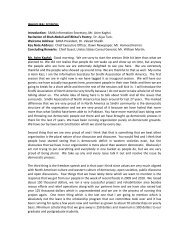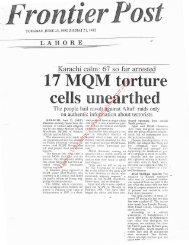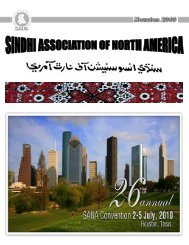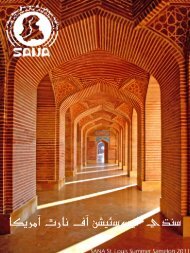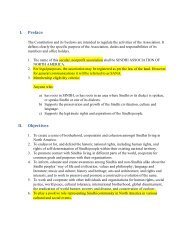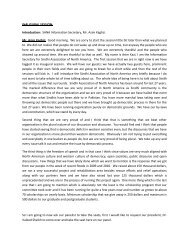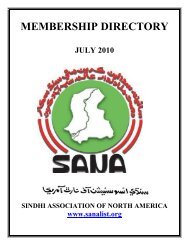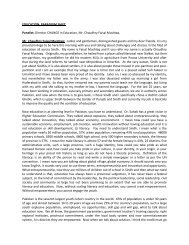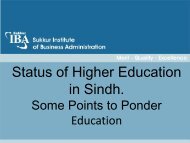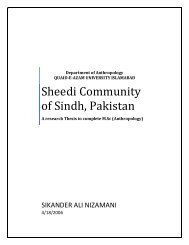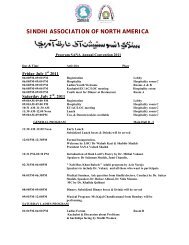ROLE OF CIVIL SOCIETY IN CHANGING SINDHI CONSCIOUSNESS
ROLE OF CIVIL SOCIETY IN CHANGING SINDHI CONSCIOUSNESS
ROLE OF CIVIL SOCIETY IN CHANGING SINDHI CONSCIOUSNESS
You also want an ePaper? Increase the reach of your titles
YUMPU automatically turns print PDFs into web optimized ePapers that Google loves.
<strong>ROLE</strong> <strong>OF</strong> <strong>CIVIL</strong> <strong>SOCIETY</strong> <strong>IN</strong> CHANG<strong>IN</strong>G S<strong>IN</strong>DHI <strong>CONSCIOUSNESS</strong>:<br />
Introduction: SANA Vice President Noor-un-Nisa Ghanghro.<br />
Chair: Justice Fakhuddin G. Ebrahim.<br />
Panelists: Mr. Jami Chandio<br />
Mr. Naseer Memon.<br />
Mr. Shahab Usto.<br />
Mr. Masood Lohar.<br />
Mr. Zulfiqar Halepota.<br />
<strong>IN</strong>TRODUCTION: Ms. Noor-un-Nisa Ghanghro: Civil society is composed of the totality of many<br />
voluntary social relationships, civic and social organizations and institutions that form the basis<br />
of functioning society. From historical perspective, the actual meaning of civil society has<br />
changed twice from its original perspective classical form. The first change occurred after the<br />
French Revolution and the second occurred during the fall of communism in Europe. To me, the<br />
civil society, ladies and gentleman, is democratizing the governance of system.<br />
Today, in this session, I am proud that we have well known people to speak on this subject.<br />
Today, the chair of the session is Mr. Justice Retired Fakhurddin G. Ibrahim. Mr. Ibrahim is an<br />
imminent Pakistani jurist, constitutional experts, senior advocate supreme court, former federal<br />
law minister, former attorney general of Pakistan, former judge of the supreme court and<br />
former governor of Sindh Province. Please ladies and gentleman welcome Mr. G. Ibrahim on the<br />
stage.<br />
Second speaker of the session is Mr. Jami Chandio. A well known writer, activist, scholar,<br />
executive director of think tank center for peace and civil society. Mr. Chandio is author of more<br />
than 10 books on literature and politics. He was editor of daily Ibrat from 1998 to 2002. He<br />
served on board for many international and national organizations. He won two APNS awards<br />
of best writer. He is also editor of Quarterly General Freedom. Mr. Chandio is already on the<br />
stage and now I would like to invite top of that one of my very, very good friend Mr. Naseer<br />
Memon, presently CEO, SPO, served on many senior management positions, lead fellow,<br />
authored six books in Sindhi, two in English and one in Urdu, regularly writing in Dawn, Kawish<br />
and other international publications, board member of Indus Resource Center and ladies and<br />
gentleman I am proud to call on stage Mr. Naseer Memon, a very good friend of mine.<br />
Now I am honored to call on stage, personally I am very impressed, Mr. Shahab Usto. He gave<br />
me a very little introduction of himself, formerly public servant, currently lawyer and activist,<br />
writer, social service activist and he is very active in flood relief, civic services on different<br />
projects, Mr. Shahab Usto.<br />
Ladies and gentleman, there is a very energetic person and I am also pleased to announce his<br />
name for the panelist of my session today Mr. Masood Lohar. He is one of those young Sindhis<br />
who have brought a new dimension in development sector. Masood currently works for UNDP<br />
and through his GEF SGP Program he has immensely contributed towards institutional<br />
development at grass root level. Mr. Lohar is also a writer. He is an unpublished English<br />
novelist too, Mr. Masaood Lohar.
Another fellow today on the panel is Zulfiqar Halipoto. He is writer, columnist, civil society<br />
activist. He is engaged with Sindh Development Forum and he is author and editor of more than<br />
15 books, Mr. Zulfiqar Halepota.<br />
Jami Chandio: Thank you very much Noor-un-Nissa for inviting me on this stage. First of all, I<br />
would like to congratulate SANA for organizing the second Sindh Convention in Karachi, Sindh. I<br />
think this could be the best way to bridge the gaps of understanding among various shades of<br />
life, among various communities living in Sindh and this could be a proper forum to coin some<br />
workable and pragmatic ideas and solutions to our challenges that we are facing today. This<br />
session since morning we heard about the issues of education, issues of economic plight, issues<br />
of economic distribution, challenges of entrepreneurship, economic development and by large<br />
issues which are related to infrastructure of society or the material aspect of society. I think this<br />
session is very pertinent that it is more about the superstructure of society, how society feels,<br />
how society thinks, what could be the possible interventions that civil society can make to<br />
improve the level of consciousness and to lay the foundations for a more moderate, progressive,<br />
secular and democrat society. So, in a way I do believe that this session has much significance to<br />
the challenges that we face in Pakistan and especially in Sindh.<br />
Before discussing the pertinent issues, I think we must be very much clear about one thing that<br />
consciousness, be it Sindhi consciousness or consciousness of any society. I think before<br />
discussing the pertinent aspects of consciousness in any society or Sindhi society, we need to<br />
understand the dynamics or the cognitive dynamics of consciousness. Personally, I do believe<br />
that consciousness is not merely a subjective phenomenon. It is the objective situation or the<br />
objective realities, be it economic realities, social realities, cultural realities, political realities,<br />
environmental realities. Basically, the objective realities of society together manifest the<br />
consciousness that any society has. In a way, I think that when it comes to the issues of<br />
consciousness or enhancing or improving the quality of consciousness in Sindh, it is also much<br />
related to the economic situation, the political issues, the cultural dynamics and the challenges<br />
that we face. The very first point that I would profess that to influence and improve the quality<br />
of consciousness in Sindh we need to construct a discourse about existing social structures,<br />
because it is not the subjectivity that manifests our consciousness, it is the objectivity that<br />
manifests, articulates our consciousness and in any society, in Sindh I think our urban society is<br />
or the space for free thinking or the space for exercising and enjoying democratic rights in the<br />
society, I think urban society of Sindh has been hijacked by terrorists, by extremist elements and<br />
regardless of color, class, creed, religion, ethnics, language mainly because of the peculiar<br />
environment that exists in Sindh I think the space for free talk, free discourse, free interactions,<br />
free will, free thinking has been hijacked and we have to reclaim that space and without<br />
reclaiming that space we would not be able to engage majority of the masses into mainstream<br />
politics or any other engagement.<br />
When it comes to rule of society, we are living in 21 st century. Feudalism by and large is an<br />
obsolete social system and feudalism in its very nature is against freedom. It is against<br />
democracy. It is against liberal values, so I think to enhance and promote democratic political,<br />
social, cultural consciousness in Sindhi society, we need to construct a discourse about existing<br />
obsolete social structures. The second step, Sindh historically had been by and large a very<br />
Singulair society or we may call it that the majority of people living in this part of the world were<br />
mainly Sindhi speaking before partition but we live in today’s realities and today’s reality is that<br />
Sindh has become a very diverse society where we could see diversity in terms of language, in
terms of cast, in terms of creed, in terms of religion, in terms of political thinking, in terms of<br />
ethnicity and let me say one thing that if we deny diversity, the diversity would become our<br />
weakness. It would become a source of conflict in society and if we start thinking and if we start<br />
respecting diversity then I do believe that diversity could be our strength. So, on this forum I<br />
would like coin this idea that in today’s Sindh we find conflicting and competing narratives but I<br />
would wish and I do feel that civil society of Sindh needs to construct a common narrative which<br />
could serve the legitimate interest of all people living in Sindh. So, I think my second point<br />
would be that instead of focusing more upon conflicting narratives, we need to construct a<br />
common narrative and that could really bridge many gaps of understanding in context.<br />
Third thing, you all know that when Europe was transforming from feudal society to modern<br />
democratic society, it was basically what they did, they laid the foundations of a professional<br />
society. I think in the context of Sindh, I would say and I would suggest that to influence and to<br />
improve the quality of thinking or consciousness be it urban or rural Sindh, we need to lay the<br />
foundations for a professional society. It is the economic activity which makes us think like this.<br />
So, I think to change and influence the consciousness of Sindhi society we need to transform<br />
Sindhi society from feudal to urban society based on entrepreneurship. In last session, we<br />
heard a lot about challenges and spaces that we have in this regard. My third point again for<br />
diversity in Pakistan, unfortunately, what we have been witnessing and what we have been<br />
hearing since inception of Pakistan that foundations of Pakistan were laid not by respecting<br />
diversity, but we adopted a self deceptive thought of paradigm of uniformity instead of<br />
respective diversity and I do believe that you cannot create unity in any society by denying<br />
diversity. Unity could always be created in any society by respecting diversity, so I think that no<br />
matter if some sections of population if they speak Urdu and they live in urban areas and also<br />
rural areas, I think we the indigenous people of Sindh have no problem with that and we should<br />
have no problem with that. We need to construct a narrative. We need to construct a sense of<br />
ownership among all the people who are living permanently in Sindh and for that I would say let<br />
us what civil society can do. I think civil society can really start a new culture. We can lay the<br />
foundations of a new culture which could exhibit civic courage, political courage, intellectual<br />
courage to respect diversity instead of denying the diversity.<br />
My last two points would be that when it comes to the rule of civil society, this is 21 st century,<br />
we are not in island, we are part of this world and we have to be integral and active part of this<br />
world and for that we need to bridge the gaps of understanding communication at all levels<br />
between global civil society and local civil society and I think this is the area where we could<br />
really see liberal space where civil society can develop and enhance such role by bridging the<br />
gap of understanding opportunities and freedom of thought exchanging their views and I think<br />
in today’s world it has become much easier as compared to the past that now in today’s era, we<br />
can really make apparently a very downtrodden and a very backward society, we can make the<br />
society as a _____ (19.43) society and we can really bridge the gap and for that I do believe that<br />
we need to develop institutional linkages and since this convention is being held by SANA, since<br />
you are also part of local civil society as well as global civil society, we have been discussing<br />
these ideas since years with SANA and even this time friends came all the way from USA. I think<br />
we need to develop institutional linkages as SANA is making with IBA Sakkhar. As SANA can<br />
make with various institutions, so this is the age where we can benefit our society, our<br />
generations to come by bridging the gap and developing the bridges between global and local<br />
society.
My last point would be, unfortunately, the image that Sindh has earned during last couple of<br />
decades, Sindh is a society of decoits, Sindh is a society of feudal, Sindh is a society of corrupt<br />
bureaucrats, Sindh is a society of narrow-minded nationalist, Sindh is a society where people do<br />
not intend to work. I do not know whether this is true or not but since a very famous saying<br />
that perception is bigger than reality, we need to change this perception and how can we<br />
change this perception about our society which had been very liberal and secular and humanist<br />
not through days and weeks and years and centuries, since millennium. We are proud of this<br />
tradition, but unfortunately in this peculiar condition of Pakistan that we are facing we have<br />
earned an image of a society which is brutal, a society which is feudal, which is inhumane, which<br />
is not tolerant. No matter we do not have talibans, but we have so many other tendencies. So I<br />
think and I do believe that to change that perception about Sindh, the civil society of Sindh what<br />
we can do that we have to look at the global human culture that is emerging in today’s world<br />
and what is that I think democracy is persuasive image of today’s world. Democracy earns an<br />
image for you and as my friend Dr. Valeed Sheikh said that SANA is a very democratic<br />
organization, I would suggest that this lesson could be learnt by our political parties, by our<br />
many other institutions and also by individuals that if we buy or if we adopt the value of<br />
democracy, because I do believe that democracy is not merely electocracy, democracy is a<br />
conduct, is a value, is an approach, is a behavior, is a norm and above all it is an interest and<br />
above all it is a path and it is a way forward and I think that to change the existing bad image of<br />
Sindhi society or society of Sindh, we need to correspond with emerging global trends and this<br />
would be my last point democracy is a persuasive image of today’s world. We need to enhance<br />
democracy not on the day of elections but in our daily life. We need to exhibit democratic spirit<br />
not on one day, but we should make it a part of our life. Secondly, as I said that Sindh is a<br />
diverse province, the entire globe is diverse and diversity and plurality is a reality and it is a<br />
beautiful reality. So I think being a society, we need to correspond to this value and we need to<br />
be part of the rainbow identity of galaxy of cultures which exist in today’s world. I always do<br />
believe that the rainbow identity where rainbow is just one but it has seven colors, so we can be<br />
one but we can also be in seven colors. So I think to earn a better and democratic image, we<br />
need to correspond with this value.<br />
Third point which was also discussed in previous session minorities, though I really feel bad<br />
when I coin this term which is really very derogatory that why some parts of society are being<br />
termed as minorities, but unfortunately this term has become part of our vocabulary but the<br />
spirit is those who are in minority be it in a religious sense or in linguistic sense or any other<br />
sense I think we have to respect, we have to mainstream, we have to create space for all<br />
minority voices and interest and that is also a global trend in culture.<br />
Two more things and that issue was also discussed in previous sessions as Jahangir Sidiqqui said<br />
that Mahateer Muhammad said that the key reason behind the success is that they started<br />
creating space for woman in their political, economic and social life. I think gender equity,<br />
gender balance, women development these are the emerging global human values. In Sindhi<br />
society which has been compelled to adopt the traditions like karo kari and many other things, I<br />
think we the male members of Sindhi society need to change our mindsets and we need to<br />
create space for our daughters, our sisters, our mothers, the half of the population of society<br />
and mind it that without enhancing the economic intellectual, political, social, cultural role of<br />
woman, we cannot develop. We need people like Noor-un-Nissa. We need people like her who<br />
could really inspire people in generations. So I think Sindhi society needs to be sensitized so<br />
that we could create space for women; and last thing, today’s world is not a world of religiosity
y and large, this is a secular age and secularism has emerged as a global value and we should<br />
exhibit by saying that we do not want theocratic Pakistan, we want secular Pakistan and we the<br />
people of Sindh who have been secular who have been secular since millennium we should once<br />
again profess upon this global value that we want to see Sindh secular society and we want to<br />
see Pakistan as secular society and in fact we also want to see the entire globe as secular<br />
society. Thank you very much. If you will have any questions, I would love to respond.<br />
Thank you very much Jami.<br />
Naseer Memon: Thank you very much Noor-un-Nisa. You are very generous. I wish you have<br />
talked more. Last point means last point. I have eight last points, but you have 10 minutes<br />
though. I know that. I will not violate that limit hopefully. So, thanks to SANA for inviting me<br />
and giving me this opportunity to share my views. It is a vast topic and the challenge to<br />
conclude my thoughts and consolidate within that 10 minutes. I think Jami has talked about so<br />
many points. Initially, I had some 12 last points but now I am left with only six or seven last<br />
points and I would not go into the details however and to avoid repetition I will focus on very<br />
few things which I guess, which I think, which I wish that civil society can contribute towards<br />
Sindh. When you say Sindhi consciousness, I want to just briefly touch upon that Sindhi<br />
consciousness. It does not mean a narrow band of ethnic Sindhi. I believe it was G.M. Syed said.<br />
I do not have a problem if Fakhruddin G Ibrahim cannot speak in Sindhi and Dorah Patel cannot<br />
speak in Sindhi. These are better Sindhis than those who sold the interest of Sindh while<br />
speaking Sindhi. So I will look into the things in a broader spectrum. However, a greater focus<br />
would be on the emerging rural civil society. The reason being, I agree with Jami, very<br />
unfortunate I have sympathy with urban middle class and urban civil society. They are the worst<br />
victims of feudalism. In Nawab Shah you can speak against Zardari, you cannot speak in<br />
Nazimabad, so that is just one indicator that where is the feudalism. So I would take pride that I<br />
live in a much brighter and a tolerant society in that context coming from rural and I take pride<br />
of this. Now the challenge is with the social configuration of Sindh. What does not a low civil<br />
society to evolve and take strides. Rightly, Jami pointed out that the ages old obsolete shackles<br />
of feudal society and keep in mind that it is not a society inherited organically. Today’s<br />
feudalism does not have any public legitimacy. No absolutely not. We disown this feudal raaj,<br />
one landmark event was 88 selection. Take any big landlord’s name and Sindh was lying flat on<br />
ground, so Sindhi society has long before rejected this feudal structures. They are now state<br />
sponsored feudal’s rural Sindhi society. So let’s be very clear on that. Tell me if any brigadier<br />
has ever visited a vice chancellor to have a cup of tea with them. They go to have shikars with<br />
vaderas. Tell me a prime minister going to have highly educated renowned man who<br />
contributed towards education of Sindh and Pakistan, they go to vaderas. So that is how these<br />
state lords they are protecting this feudal society to create barricades and barriers in the growth<br />
of Sindhi civil society which has enormous potential to tax this society out of this quagmire. So<br />
that is how I said the civil society is also hijacked.<br />
We live in a stagnated, artificially stagnated society, so that is our problem. How much is the<br />
age of this middle class, tell me one thing, why civil society gives sort of a stagnant look at a top<br />
view that is my perception. You can disagree to that. To count the age of tree, you know how<br />
you can count the age of tree without knowing the age of tree. You cut a branch and count the<br />
rings on the cross section. That determines biologically the age of tree. So you have to<br />
understand the age of civil society count the number of rings of democracy in that society.
Count the number of years middle class has gained actual space in the society. That will<br />
determine how a civil society could have been effective or not, so the problem with us the<br />
current generation of Sindhi middle class evolved after 90s, I would say It is a roughly thin<br />
borderline. I believe that is the real middle class which is the product of process. Not product of<br />
any political patronage starting from the ethnic rights of late 80s, so this is how civil society has<br />
evolved in Sindh. It is very nice if you ask me. 20 years is no big deal in history and it has taken<br />
major strides in just two decades, so I see a silver lining in that. I am trying to sum up what this<br />
civil society should do. What we can do. What we should aspire to do.<br />
I would start from the last point of Jami that we need civil society of Sindhi to very strongly<br />
question not just question but challenge and deny this status quo in society. Let’s refuse this<br />
status quo. We absolutely do not want it. It is imposed. Let’s be very clear. It has been<br />
imposed on us and we do not support this status quo. This social transformation has to be<br />
expedited. That should be the mission of Sindhi civil society but then how to go about. Actually,<br />
there is no pill for all ills, but then there are things to promote, if we cannot do it ourselves but<br />
we can think of promoting it at least in our lives. First and foremost respecting, promoting and<br />
honoring merit in society. That is the biggest challenge for Sindh today. From teacher to<br />
minister, all are merit placed, virtually all of them. Exceptions yes, then exceptions do not<br />
matter. Those who rule the society who are determining the directions of society a vast vast,<br />
big big big majority of them are meritless. So I think Sindhi civil society has to stand up and<br />
demand for a merit based society and demonstrate that merit commitment in our daily lives<br />
right from taking a small decision of inviting a speaker to recruiting somebody on any job. That<br />
is one thing I would like we should work up on. The opportunity which is often cursed I see a<br />
small part of opportunity in that that is globalization, believe me, we often curse it on a some<br />
other dimension, economic, exploitation in a bigger picture but the technological advancement,<br />
access to technology, access to people having more space to create alliances that is an amazing<br />
opportunity for today’s Sindhi civil society to count on. So that is something we need to<br />
promote. An 8 th class pass young boy from Johi writes an e-mail to the oil company’s<br />
headquarters and then that village gets compensation of land just small small small example, so<br />
this is how we can intelligently use the technological options. Another important thing is when<br />
the institutions are crumbling, they have been handed over to mostly to the non-merit and<br />
corrupt elements to destroy society and another role that Sindhi civil society can play is to<br />
create alternate institutions in Sindh. It does not mean we can create big universities over night.<br />
We may not have that much capital. Let’s start with one room. Let’s start with one e-mail<br />
address. Lets just think and dream about it, but we need to create alternate institutes as SANA<br />
friends are collaborating with IBA. We can think of chain of other institutes may be English<br />
language laboratories, may be computer centers, anything, enterprise, developments and<br />
something we need to invest in human resource, invest in technology and invest in institutions.<br />
That should be the motive of civil society to shape up tomorrow’s Sindh and then by that virtue<br />
to create space for Jami mentioned about minorities.<br />
I would like to strongly mention about the space for women in Sindhi society. 50% population in<br />
Sindhi society is virtually not utilized, so 50% of your strength is lying back gathering dust in the<br />
homes. I am sorry I do not want to be sound derogatory but that is a reality, but are we willing,<br />
are we really desiring to open the spaces for women in Sindh. Let’s at least have another 50%<br />
additional power in your hands. What is the reality. Count on the civil society institutions.<br />
Media, tell me how many women are working in Sindhi media. NGOs, a little better but not to<br />
the extent it should have given the space. I then think about any other middle class institution,
you find very small portion for Sindhi women, so we need to create space for women to multiply<br />
our strength and promoting argument rather than rhetoric rather than taking shelter and<br />
glorifying our past. We are great because Shah Latif was great. We are great because Mohenjo<br />
Daro was great. There were many great nations and people vanished from ground. They are<br />
nowhere, so do not be captured in the past glories. If we can secure our today and tomorrow<br />
only that will guarantee our future. So let’s jolt our nation and let’s jolt our society and tell<br />
them we were great. It does not essentially mean we will continue to be great without working<br />
hard and being committed to the society and being committed to change. We will change<br />
literally the mindset. Unless we change the minds, we change the approaches, we change the<br />
thoughts, society cannot be physically changed.<br />
Just one last thing I mean really last is to connect civil society with mainstream politics. We have<br />
grown up in the society where we saw the chalking on wall. Remember civil society, NGOs,<br />
media, whatever they are doing but they are not the solution. Solution lies with politics. Let’s<br />
be very clear on this. We have to accept we can contribute towards a bigger change but change<br />
is to be led by politics, let’s make politics accountable and support them, not just accountable,<br />
support them, criticize them with all honesty, be part of that political process and then hold<br />
them accountable with your argument and with your logic.<br />
Noor-un-Nisa Ghanghro: Thank you very much Naseer for following the timeline. Ladies and<br />
gentleman please welcome Shahab Usto.<br />
Shahab Usto: Thank you very much. If you know me, I would really digress a little because my<br />
topic is actually has to do with civil society, so it has to be qualified first what do we mean by<br />
civil society, because I am very sorry to say that it seems like it is a middle class discourse we are<br />
talking about. Civil society is not middle class discourse it is about the lower classes led by the<br />
civil society. We have not so far uttered even a word about working classes, about the peasant,<br />
about the laborers, about the masses of lumpen what we call proletariat which are equally the<br />
victims of our so called identity of which we middle classes are so much conscious. This is not<br />
the issue of identity, it is an issue of existence and we talk about existence. I think we rely a lot<br />
about on the lower classes on the people those are toiling day in and day out, so my humble<br />
submission would be that when we get together we must not forget that we are just a small lot<br />
of people who are actually supported or bolstered by the huge number of dispossessed,<br />
denuded, disempowered working classes especially the rural society which is nowhere. They<br />
are ruthlessly suppressed, exploited, battered by the feudal norms state sponsored operations<br />
and when they are pushed about when they are ejected from their strongholds which used to<br />
be once their agricultural bases by the economic or political or ecological factors, they are not<br />
even welcome to the cities. So civil society I think has to first of all re-orient itself inwardly<br />
because I am sure when I go to the villages those people those half naked people, barefooted<br />
people look at me as if I am an outsider just as we look at the metropolitan, cosmopolitan,<br />
authoritarian, totalitarian people as an outsider or oppressive. So there is a disjoint within<br />
ourselves as well we should not forget that.<br />
Our middle classes should connect with the present rural masses which we are not. We are<br />
actually engulfed in the metropolitan discourse which is about culture, identity and<br />
employment, so politics is not about metropolitan conflicts, it is about the existence in totality.<br />
So I would really not come up with an answer here. I would rather leave a question for all of<br />
you whether the peasants, the rural laggard masses are part of the civil society or not. If they
are part of the society then are we equipped with an answer to them. How many of us actually<br />
are the representative of civil society, went over to them and helped them when they were<br />
jostled about battered by the bureaucratic and natural disasters, very few. They were left at the<br />
mercy of bureaucracy. They were left at the mercy of absconding politicians. They were left at<br />
the mercy of may be a few NGOs. They are still 1.4 according to the government figure people<br />
who are waiting for us. Where is our civil society. Well, this is a question of utility. You see this<br />
is a very modern state and every section of society has its utility. There is no charity in society.<br />
Every section of society has its vested interest. Every section of society has its own class<br />
interest, its own identity problem. It is the work of the intellectuals to somehow if not remove<br />
then negotiate. We have not done that. We must negotiate these differences if we have to<br />
create a common whole. We are only worried about the identity, the culture, the societal<br />
difference, but not the cracks, not the core and the core is not with regard to a particular<br />
political discourse, it has to do with the existence. I keep repeating, so it is a question of<br />
existence. All our political forces with due respects they have hundreds and thousands of<br />
workers they can do a lot and this is a state which is shrinking.<br />
This is a state which is giving way to society, a society which has to take up that role, a society<br />
which can play, which is actually playing role in varied forms. Look at Hamas. Though it may not<br />
sound fashionable but Hamas as far as the social organization should be a role model. Look at<br />
Akhwan Ul Muslimeen. Look at Hisbullah. These people have there political mission but they<br />
are not leaving the people at their mercy when there is no state. So there is another question<br />
for you what solutions do the civil society have about the people those who are stateless. Do<br />
we wait for the state to get its act together or do we step in and fill the gap which the state is<br />
receding and creating. There are lots of doctors. There are lots of engineers. There are lots of<br />
teachers. There are lots of different kinds of professionals who can connect with the people<br />
who are stateless when I say stateless, I say they are not being catered to by the state and there<br />
are millions of them, so my humble submission is that we have got to look at the whole<br />
composition of civil society. We have got to redefine the role of civil society.<br />
We have got to understand the relevance between the civil society and state structure. These<br />
are very important variables that we have to keep in mind. Democracy is an abstract ideal, how<br />
are you going to translate it. Why civil society are for that matter fringe. Political forces have<br />
not been able to win over the masses. Why still they are harkening after feudal. These are the<br />
questions for us. We should be the leaders. We have the right credentials. We are educated.<br />
We have earned it but why they are not following us. Why they are not looking at us because<br />
they consider we are outsiders. We do not go to them. We do not outreach them. We do not<br />
overreach them. We do not reach out to them. We just pass by them. We talk about them.<br />
We make good arguments about them. We create empathetic and pathetic. We conjure figures<br />
of pathy and empathy but we are not with them. So Bhutto was not Bhutto if he was not with<br />
the masses. Gandhi was not Gandhi if he was not with the masses. We are not what we are if<br />
we are not with the masses. So it is good that we have learned quite a few good things about<br />
the modernity, the global currents of thoughts and actions but the question is connectivity. Just<br />
as the state is not connected within itself and without so are we disconnected within ourselves<br />
and without, so my humble submission that it is time we should not look at things from the<br />
outside. We should be part of the theme because we are part of the theme. No matter<br />
whether we are in this posh very cozy atmosphere talking about big things or we are standing<br />
outside in the cold with those people who do not have sweaters to wear and blankets to sleep<br />
with. What good is that fashionable philosophy that we cannot provide blankets and sweaters
to our people and how are we going to convince them that yes we are your leaders when we do<br />
not have one little temptation to go there. Why cannot go there. We can go to America. We<br />
can go to London. We can go New York. We can go to anywhere but we cannot go to Badeen,<br />
we cannot go to Sanghar. Why? This is a question of utility. We have to understand if we are<br />
not good for these people, they will throw us out as they have done for the last 60 years. They<br />
have not accepted us as their leaders. They still go after some botar or some vadera, because<br />
they are their, they manipulate them. If need be, they also help them. Our civil society, I am<br />
not saying everybody is not doing, most of them are very much committed and I am very proud<br />
of them, but I wanted here to raise this question because we are getting outwardly. We need to<br />
be inwardly. We got to understand what is happening within us. We have to be subjective as<br />
well as objective. Objectivity is good because it is pleasurable to talk about others. What is the<br />
stinking smell that comes from us? Are we ready to take it? No, we are not. So that is the<br />
question that I keep regardless of ethnic or culture or religious or whatever you call<br />
differentiation that we may have here. What is important is that people are our future. Those<br />
people work for us. Those people are the guarantee of our future and survival and they do not<br />
have education. They do not have clothing. They do not have homes. They do not even have<br />
self dignity which is guaranteed by the constitution.<br />
So it is not the abstract question of democracy or ideas, it is a question of survival at this time.<br />
So these are the questions I would really appreciate if the coming session would get up, what<br />
roles political parties are going to take, to go to those people. We do not need sophisticated<br />
politicians. We need people like Bhutto, we need people like Gandhi, who can go to the people.<br />
If not, then please do not complaint feudalism is powerful, it will remain.<br />
Noor-un-Nisa Ghanghro: Thank you very much Shahab. You are very right saying that. Please<br />
welcome Masood Lohar.<br />
Masaood Lohar: Thank you Noor. I have good news. I will finish my presentation in 5 minutes.<br />
I am sorry we do not have much time. Now you can see that a donkey is being carried by its<br />
owner in a car. There is another scenario which can be the future of us if we do not be frank,<br />
tolerant and polite at this time. Now I have a lot of difference of opinion with Jami Chandio. I<br />
really do not like it, but tell you the truth, today I was amazed that he was exactly speaking the<br />
same thing which I was thinking then Naseer Memon he spoke almost the same thing, and you<br />
remember we were discussing before coming here. Now that is the consciousness. That is your<br />
collective on conscious that is your consciousness. The change is coming.<br />
In sociology there are two terms which are used, the tipping point and the critical mass. The<br />
tipping point is that suddenly something, a phenomenon very rare can suddenly come into<br />
existence. That is tipping point. For example, people are disliking some brand may be some<br />
particular thought and idea come and suddenly the society in general starts believing and<br />
accepting it. That is tipping point. Critical mass is millions of Sindhis got together in the river<br />
and we got a flood after such a long period of drought so the strength is the positive energy.<br />
Now what I am saying and trying to tell you here is your society, your potential, your youth is<br />
ready. The only thing is that we have to take care of some mess which has got collected,<br />
accumulated at our doorsteps and our courtyards.<br />
Ladies and gentleman let’s be very practical now. If you are really serious about this, so let’s do<br />
some business. Let’s come to some conclusion and then the thing is that let us be very
thorough. But I tell you ladies and gentleman Sindhis are the only politically wiser communities<br />
in Pakistan and Pakistan should take this as an asset. We are your asset. You are a vibrant<br />
society with a consciousness of wisdom. We are stuck in some paradigms and we need to have<br />
some paradigm shifts. Tipping point is everybody is converted. Everybody is converted from a<br />
molvi, I mean all classes are on the same page in that context but the problem is our political<br />
leadership is stuck in old paradigm. One unit empty one unit hangover. It started from anti one<br />
unit struggle. He is learning Spanish. He is not inspired from me. He is not inspired from Qadir<br />
Magsi. He is not inspired from any other political leader here. I am sorry yes. So I think we<br />
have to understand this new thing. Political parties and political leadership has to come up with<br />
some new innovations to attract people, otherwise masses will not be attracted to you. That is<br />
a mediocre leverage. Somebody who does not know anything about economics and he is<br />
questioning the wisdom of Amartya Sen. This is something like that. Dr. Baloch was ridiculed,<br />
insulted in a program right in Sindhi language authority. My generation and my previous<br />
generation have failed. We are failed. Let us accept this. You can do fellowship. Why not<br />
Jahangir Siddiqui fellowship. Track one is politics, so how much track one is integrated with<br />
track two. Favorite quotation from Alice in Wonderland. If you are just going anywhere any<br />
road can lead you there.<br />
Ms. Noor-un-Nisa Ghanghro: Now I will call on stage Mr. Zulfiqar Halepota. Please welcome.<br />
Zulfiqar Halepota: Thank you very much Masood. But I am afraid that when you are among last<br />
speakers so you basically are deprived of both time and talk so most of the points which I have<br />
written in my paper are covered by my friends which I do not need to repeat and in 10 minutes I<br />
will try to finish my opinion. My understanding of civil society has been very drastically<br />
expanded, not its scope but mandate and intervention in society from political parties to NGOs<br />
it is a broad definition of civil society and there are a lot of components.<br />
Noor-un-Nisa Ghanghro: Thank you very much Mr. Halipoto for watching timeline. Friends<br />
now the time is to hear from the chair and I would like to invite Mr. Fakharuddin G. Ibrahim to<br />
come on this podium and share his thoughts.<br />
Fakharuddin G. Ibrahim: Friends first of all, I am grateful to SANA for inviting me this afternoon.<br />
It has been a very rewarding experience and I was really looking forward to meet my friends<br />
from Sindh today. I was really very happy. Sir, you did very well in acknowledging the services<br />
of Mr. Karim Lodhi. He was secretary to the Government of Sindh when I was governor and the<br />
only bureaucrat that I know of who told the prime minister in my presence, prime minister you<br />
are wrong, prime minister you are wrong then you rewarded my friend Sobogian Chandani.<br />
Unfortunately, never I have forgotten man in my mind, the man responsible was the first person<br />
to be detained under prevented detention law. He was the first person who had challenged it.<br />
He was the first person who succeeded in it and he has remained a freedom fighter all his life.<br />
Sir, you also honored Noor-ul-Huda, a fighter for women’s causes. I read her in Dawn and at<br />
least you know these are the persons who give us reasons to be alive. These are the persons<br />
who give us reasons to be alive and finally Mr. Ibrahim Joyo coming here to us in his advanced<br />
age. I tell you my admiration. I knew the man very well. I know him very well but you tell me<br />
the senior most progressive writer in the country today is from Sindh and he is before us today.<br />
What more can we ask for.
I tell you SANA you do not know what you have done to us. SANA you do not know what you<br />
have done to us. I have reached green years of my life. I hear less. I see less but my enthusiasm<br />
is still with me and today SANA has contributed and has increased my enthusiasm. Look in one<br />
room 100 by 100 at the most so many intellectuals from Sindh collected together and to talk<br />
about Sindh. I am telling you it is a rewarding experience for me and for all of us. My hat is off<br />
to SANA. So many believers of the community present at one time and are prepared to speak<br />
their mind without fear and without favor. With you people around, I cannot lose all my<br />
enthusiasm. My enthusiasm still remains with me. I must tell you one thing ladies and<br />
gentleman, I am a beneficiary of Sindh. I am a beneficiary of Sindh and I do not like the word<br />
muhajir. I come from Bombay and at the most you can call me ex-muhajir and ladies and<br />
gentleman how can a person who is born in Sindh in Karachi call himself muhajir, it is beyond<br />
me. It is really beyond me.<br />
As I said earlier, I am a beneficiary of Sindh and let me tell you what happened, I have come<br />
here in the year 1951 and I did not know anybody here. I came from Bombay and I went to<br />
Karachi University. There was post of assistant lecturer in international relations Karachi<br />
University and I had applied for it and my weight was what it is today and my height could not<br />
be more. In five minutes, I was said good bye. They thought how could I possibly control the<br />
students. I was told later on but a few days later I got somebody told me that principal of Sindh<br />
Law College wants to see you. Now I thought to myself I do not know who this gentleman is, he<br />
must be some Sindhi gentleman whom I do not know. I went there. I saw him and immediately<br />
recognized. He was there at the university when I went for my appointment and he was one of<br />
the persons sitting to examine the candidates and I therefore recognized him and he asked me<br />
one question young man what do you want to do. I said sir I do not know what I want to do. I<br />
do not know whether I want to join foreign service because I have done diploma in international<br />
relations, whether I wanted to teach, whether I wanted to do law. He said young man you are a<br />
lecturer in Sindh Muslim College from tomorrow 200 rupees a month and you can take your<br />
own time to decide what you want to do with yourself and that sir a Sindhi gentleman telling me<br />
and my life changed after that, please understand that. What I cannot understand is I have<br />
never understood. He was my benefactor. His brother was my benefactor. Two people from<br />
Karachi, Sindh, Tufail Ali Abd-ur-Rehman and Hassan Ali Rehman were my benefactors, but let<br />
me tell you this was told to me by first Grant Controller of Karachi Mr. Mohsin Siddiqui. When I<br />
was governor you know I had a very difficult task because; I was supposed to be a man who goes<br />
between the muhajirs and Sindhi ministers and what now. It was a very difficult task. He once<br />
came to see me and he told me something very interesting. He said look Fakhru Bhae when I<br />
came and when I was Controller, then I had the power to allot properties, vacat properties<br />
which the Hindus had left behind and he told me that you would be surprised that these all<br />
properties were left empty and the local Sindhi did not take the property unlike in Punjab and I<br />
have allotted those flats to muhajirs in Karachi. I think that we are all new Sindhis but we are all<br />
Sindhis. That is the end of the line.<br />
Let me tell you, my experience with Sindhis. I have not yet met a Sindhi who was a fool. He is a<br />
man with great common sense though common sense is not so common but he is a person with<br />
great common sense and let me tell you that lawyers came from Hindustan and sometimes<br />
people said I do not have a degree I need enrollment. Hassan Ali Rehman was chairman of<br />
committee which had to certify whatever it was, so they went to him and they said sir I am an<br />
advocate from so and so place in India, so Hassan Ali Bhai asked him where is your certificate, he<br />
said we forgot certificate over there and I do not have it. He asked will you swear an affidavit
that you are a lawyer. He said yes sir I will swear an affidavit. Mr. Hassan Ali Rehman would<br />
enroll him as an advocate. What can I tell you why are all these differences. Nothing of that<br />
kind. It is still very exciting. Let me tell you one thing which I did not like. There are a lot of<br />
people doing welfare here. Please do not underestimate them. I know of school which I have<br />
something to do with it. One day it is in Ibrahim Haidry, some locality which is very far and<br />
there is a function and I went there and this girl of 11 years old, and it is a free school by the<br />
way, and she gives some presentation to me in English. She was hardly 11 or 12 years old and I<br />
asked her what your father is doing and she said my father is a fisherman. Do not become<br />
dishearten. There are a lot of good things which are taking place. There are a lot of things<br />
which are not happy about. I will come to that a little later. There is a young boy from that<br />
same school and he came and he was invited by NASA. He went there and he learned about<br />
NASA and what not. He came to give us a lecture with computer and all that which I do not<br />
understand so much but he gave a lecture to us for about 45 minutes and we are all<br />
dumbfounded as to what he had learnt there and I asked him what is your father doing, he said<br />
my father is a driver.<br />
Now is the time to speak up. Days of silence are over. Now is the time to speak up whether it is<br />
judicial, whether it is military, whether it is civil government, now is the time to speak up and if<br />
you do not speak up now, you are going to regret it. Please understand this. This is not the time<br />
to remain silent. We have no governance. We have no law and order. We took 25 years to give<br />
a consensus constitution. What is constitution. The rule of country. Where does the<br />
independent judiciary come; the heart, from the constitution. Where do your rights come, from<br />
the constitution and we are without constitution for how many years, 30 years, and you took us<br />
another 30 years to realize that there is an article 5 in that constitution which says it is your<br />
invariable duty to obey the constitution. Truth in public interest is the defense and that<br />
alamdar-e-Islam, he removed that, he deleted that. In an Islamic country truth in public interest<br />
not a defense in an action in deformation. The person who gave us consensus 1973<br />
constitution. We committed judicial murder of that man and we kept quiet. Most of us do not<br />
go to vote. I am a beneficiary of Sindh. I do not know what I possess and I do not know what I<br />
want to possess and I cry. I cry when I see so much love and affection around me. I want to see<br />
all the time smiling faces only. I want to see all the time smiling faces. The change is coming,<br />
whether you like it or not. Change is the demand of time and change is coming. They all<br />
wanted to get up and sing and recite Sindhi alphabet. They are all very anxious. The women<br />
were more than the man. Before I end, I am very grateful to you. I might not have many<br />
pleasant things to say but that is what our live is but things are going to change for the better.<br />
Noor-un-Nisa Ghanghro: Thank you very much Mr. J. Ibrahim.<br />
Dr. Valeed Shaikh: Lifetime achievement award you will have to put up with me again. Our<br />
next lifetime achievement award recipient is a great man. A man that my friends tell me I try to<br />
look alike, Amar Jalil. He could not make it today but a brief introduction. Amar Jalil is a fiction<br />
writer and an intellectual and a mystic I must say. He is one of the most famous fiction writers<br />
of Sindhi language. Besides pure fiction, he has also written plays for various TV channels in<br />
Sindhi and urdu language. He served as vice chancellor for Allama Iqbal Open University<br />
Islamabad, chair person of Sindhi Language Authority, member Sindhi Adabi Board and member<br />
Sindhi Language Authority and many other prestigious institutions as board member. Mr. Jalil<br />
has also been writing regular weekly columns in various mainstream Urdu, English, Sindhi,<br />
languages since last four decades. He is a mystic by nature and considered one of the icons of
Sindhi literature. I will request Mr. Kalbanri to come and receive this award for him. Amar is not<br />
doing well today and I would request Adi Ghazala our SANA member to come and present the<br />
award. Ghazaala, of course justice sahab kept referring to father again and again so I thought<br />
everybody knows her. Anyway, our next recipient of lifetime achievement award is Saen Rasool<br />
Bakhsh Palejo sahab. Saen Rasool Bakhsh Palejo of course is a prolific writer, scholar, man of<br />
letter, supreme court lawyer and a seasoned politician. He founded Awami Tehreek, an<br />
outstanding scholar. He was born in 1930 in district Thatta Sindh Pakistan. He got his primary<br />
education at local madrisa and got his secondary education at the famous Sindh<br />
Madrasatulislam Karachi. He did his law graduation from Sindh Law College Karachi. He not<br />
only led many democratic peoples’ movements in Sindh and Pakistan but also made enormous<br />
contributions in progressive movements at national and Asia pacific level. He was secretary<br />
general of Awami National Party and convener of the movement for restoration of democracy. I<br />
remember that time. He remains central executive committee member of the Asia Pacific Peace<br />
Forum based in manila. He has written more than 20 books on politics, pure literature, short<br />
stories, literary criticism, history and political thought. He is widely traveled scholar and has<br />
visited several times almost all regions across the world. As a visiting faculty, he has been<br />
delivering lectures at Jawahir Laal Nehru Dehli University, University of Chicago, University of<br />
Cambridge, University of Sussex and Kingston University. I would now request one of SANA<br />
members Mr. Taj Jamali to come and hand this award. Saen Rasool Buksh Palejo could not be<br />
here today but his illustrious son Mr. Ayaz Palejo is here. I would request him to come to the<br />
stage and receive the award.<br />
My request is that we have about 10 minutes of question, answers, then we break for tea and<br />
then it is going to be our last session. Those interested in politics obviously are going to love<br />
that very interactive session that all of us are going to enjoy and then you will have to hear vote<br />
of thanks from me, so you will have to put up with that too. We will start with the questions<br />
answers. Please raise your hands I will look for you and tell me where to go.<br />
I want to understand today I have looked into the past. It is very difficult to understand today<br />
without past. Thank you very much. Thank you panelists.



